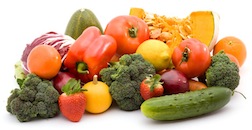 Most of us like to think we are good decision makers, that we have a firm grasp on reality, that we know the facts. Do we?
Most of us like to think we are good decision makers, that we have a firm grasp on reality, that we know the facts. Do we?
The truth is that most of us (I’m sure you, dear reader, are the exception) are poor observers of the human condition in general and of ourselves in particular. And if we do not know the facts about ourselves, if we are not honest and forthright even to ourselves, then how can we make the best decisions for ourselves?
“Effects of social approval bias on self-reported fruit and vegetable consumption: a randomized controlled trial.” How is that for a mouthful of a title? According to the Nutrition Journal (published June 27, 2008), we over-report the amount of fruit and vegetables we consume by 30% or more (and under-report the amount of food in general we consume).
Why do we under report the bad and over report the good? Simple. We want approval! We want the approval of others, and we want to approve of ourselves. We like to think of ourselves as capable, as good human beings, doing the right things.
Which is all fine and good until we start making hard decisions, independently or as a community, on soft data. It is vital that we are aware, both individually and as a society, of our observational biases, of our under-reporting and over-reporting tendencies, of our common errors in “data” gathering, of our most frequent decision-making errors.
This posting is NOT about vegetables. It is about self-awareness, awareness that the world we think we see is often not the only world out there.
— Our hopes, fears, desires, self image, and expectations all impact what we choose to notice out of the overwhelming stream of impressions and data we receive moment by moment, and
— Even after we have screened what we choose to pay attention to,
— We further screen by how we choose to interpret what we have plucked from the HUGE river of stimuli flowing around us, then
— We further screen by what we choose to remember, and then
— We have yet another tendency to “massage” our memories over time to fit our world view, our self-image.
What, then, is real? How valid are our “facts”?
To make smart decisions, it is important to be vigilantly aware of the observational bias implicit in our conclusions and to make continuing allowances, to be flexible and adaptable, always open to new interpretations, to new points of view.
This is not always easy. In addition to flexibility and openness, it also requires maturity, wisdom, humility, and balance. These are traits and skills that may take effort to obtain and a lifetime to master, but the rewards are many and they will serve you in good stead in a wide variety of situations.
I close with a verse from Rudyard Kipling’s famous poem, “If,” which deals with the need for balance and openness when you have made a decision. It also touches on the need to not let your flexibility and awareness paralyze you into decision by indecision, or paralysis via never-ending analysis:
If you can keep your head when all about you
Are losing theirs and blaming it on you,
If you can trust yourself when all men doubt you,
But make allowance for their doubting too….
(Then) Yours is the Earth and everything that’s in it,
And—which is more—you’ll be a Man, my son!
This is a classic from the NSC Blog archive, originally posted July 30, 2008.

